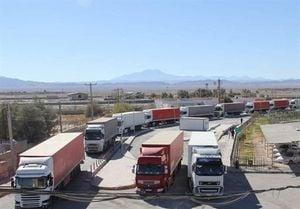In a significant development regarding international trade relations, South Korea has announced it will not retaliate against the tariffs imposed by the United States under President Donald Trump. Acting President Han Duck Soo made this declaration during an interview with the Financial Times, emphasizing the historical support that South Korea has received from Washington.
Han stated, "The support from Washington has grown historically," indicating a long-standing alliance that South Korea values despite the economic pressure from U.S. tariffs. This decision comes amidst ongoing discussions set to take place next week, during the week of April 21, 2025, between South Korean officials and the Trump administration.
Meanwhile, across the globe in Kosovo, the customs authorities have initiated a new directive regarding the valuation of vehicles imported from South Korea. This change is a response to increasing complaints from both importers and citizens about the perceived overvaluation of these vehicles. The Kosovo Customs has now decided to base the valuation on the purchase price in South Korea, rather than previous methods that relied on European market standards.
Lawyers in Kosovo have raised concerns about the implementation of customs regulations, arguing that the previous valuation methods did not accurately reflect the transaction values of the imported vehicles. Dren Kukaj, a legal expert, pointed out that the customs authorities have unjustly inflated the value of these cars, leading to higher tariffs that he believes are unfair to consumers. Kukaj remarked, "They are overvaluing these vehicles by increasing the customs burden on them. I consider this an illegal practice and also unfair to our citizens who have fortunately found cheaper vehicles that customs should value at their actual worth, which is not the case."
The new directive from the Kosovo Customs aims to harmonize the valuation of Korean vehicles with European market catalogs while taking into account the unique characteristics of the local market. This adjustment is crucial as Korean cars have become more affordable compared to their European counterparts, partly due to measures by the Korean government encouraging a shift towards electric vehicles.
In 2024, Kosovo imported five vehicles from South Korea, which had a total value of 102 Euros. From these transactions, the customs authorities collected over 6 million Euros in customs duties, approximately 2 million Euros in excise taxes, and more than 800 million Euros in VAT. The surge in complaints regarding vehicle valuations has been notable; by December 31, 2024, the customs office had received 438 complaints, with around 48 percent, or 210 cases, being approved for revaluation.
In the first two months of 2025 alone, customs officials noted that 190 complaints were filed, with 180 of those pertaining to the revaluation of imported goods. This uptick in grievances has prompted Finance Minister Hekuran Murati to take action. On November 4, 2024, he signed a decision to appoint members to a panel tasked with reviewing appeals against decisions made by the Tax Administration (ATK) and the customs office.
As both South Korea and Kosovo navigate their respective trade challenges, the implications of these policies could resonate beyond their borders. The lack of retaliation from South Korea may signal a desire to maintain strong diplomatic ties with the United States, even in the face of economic adversity. On the other hand, Kosovo's move to adjust its customs valuation reflects a growing awareness of the need for fair trade practices that protect both consumers and importers in a globalized economy.
In summary, South Korea's decision not to retaliate against U.S. tariffs underscores the importance of historical alliances in international trade, while Kosovo's reforms in vehicle valuation highlight the complexities of adapting customs regulations to meet local needs and market realities. As both nations proceed with their respective strategies, the outcomes will likely have lasting effects on their economic landscapes and international relations.





